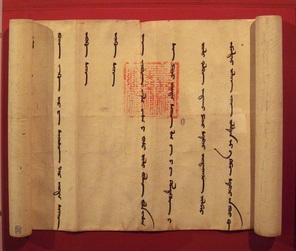These are the code of laws created by Genghis Khan that helped him govern his people.
- "It is ordered to believe that there is only one God, creator of heaven and earth, who alone gives life and death, riches and poverty as pleases Him—and who has over everything an absolute power, a different version states that there was liberty to worship God in whatever way suitable (Plantagenet Somerset Fry).
- He [Chingis-Khan] ordered that all religions were to be respected and that no preference was to be shown to any of them. All this he commanded in order that it might be agreeable to Heaven. {al-Makrizi}
- Leaders of a religion, lawyers, physicians, scholars, preachers, monks, persons who are dedicated to religious practice, the Muezzin(this latter appearing to be from the later period of Khubilai Khan unless this was further translated there had been no specific reference made to any Muezzin and cities including mosques were levelled), physicians and those who bathe the bodies of the dead are to be freed from public charges. {Al-Makrizi}
- It is forbidden under penalty of death that any one, whoever he be, shall be proclaimed emperor unless he has been elected previously by the princes, khans, officers, and other Mongol nobles in a general council.
- Forbidden to ever make peace with a monarch, a prince or a people who have not submitted. [It is apparent they presented certain proposals to the different states or kingdoms that existed that they should participate with them.]
- The ruling that divides men of the army into tens, hundreds, thousands, and ten thousands is to be maintained. He put leaders, (princes/bogatyrs/generals/noyans) at the head of the troops and appointed commanders of thousands, hundreds, and tens. {al-Makrizi} This arrangement serves to raise an army in a short time, and to form the units of commands.
- The moment a campaign begins, each soldier must receive his arms from the hand of the officer who has them in charge. The soldier must keep them in good order, and have them inspected by his officer before a battle. He ordered his successors to personally examine the troops and their armament before going to battle, to supply the troops with everything they needed for the campaign and to survey everything even to needle and thread, and if any of the soldiers lacked a necessary thing that soldier was to be punished. {al-Makrizi}
- Forbidden, under death penalty, to pillage the enemy before the general commanding gives permission; but after this permission is given the soldier must have the same opportunity as the officer, and must be allowed to keep what he has carried off, provided he has paid his share to the receiver for the emperor.
- He ordered that soldiers be punished for negligence; and hunters who let an animal escape during a community hunt he ordered to be beaten with sticks and in some cases to be put to death. {Mirhond or Mirkhwand} (may appear excluded from some accounts, can be a more restricted Siberian-originating practice, but seems genuine).
- To keep the men of the army exercised, a great hunt shall be held every winter. On this account, it is forbidden any man of the empire to kill from the month of March to October, deer, bucks, roe-bucks, hares, wild ass and some birds.
- Forbidden, to cut the throats of animals slain for food; When an animal is to be eaten, its feet must be tied, its belly ripped open and its heart squeezed in the hand until the animal dies; then its meat may be eaten; but if anyone slaughter an animal after the Mohammedan fashion, he is to be himself slaughtered. {al-Makrizi} Women were not supposed to slaughter animals this way, possibly due to being weaker, there is no prohibition in the Yassa.]
- It is permitted to eat the blood and entrails of animals-though this was forbidden before now.
- Every man who does not go to war must work for the empire, without reward, for a certain time.
- The man in whose possession a stolen horse is found must return it to its owner and add nine horses of the same kind: if he is unable to pay this fine, his children must be taken instead of the horses, and if he have no children, he himself shall be slaughtered like a sheep. {al-Makrizi} In the versions where the provisions appear the method of execution is likened to sheep therefore as in accordance it may be presumed with the law for the slaughter of animals [it is unclear in another version as of when their bodies should be cut in two parts] For lesser thefts the punishment shall be, according to the value of the thing stolen, a number of blows of a staff-seven, seventeen, twenty-seven, up to seven hundred. But this bodily punishment may be avoided by paying nine times the worth of the thing stolen. [Another older version mentions no punishment for thefts under the value mentioned, it is not so specified.]
- No subject of the empire may take a Mongol for servant or slave. Every man, except in rare cases, must join the army.
- Whoever gives food or clothing to a captive without the permission of his captor is to be put to death. {al-Makrizi}
- Whoever finds a runaway slave or captive and does not return him to the person to whom he belongs is to be put to death.{al-Makrizi} The word translated as "slave" means "captive taken for labor", the opponents of the Mongols were usually regarded by them as facing a punishment for resisting the universal principles/the Mongol system, or what it aspired to via its codes and measures, the concept was passed on also to their descendants, based on concepts of sedentary populations who degrade the people and criminal tribes, criminal already often simply by their concept of resisting to the above-referred Mongol system, the word is "bo´ol", linked to modern "boolt", band for tying, "booch" (ch as in chaver in Hebrew) is in the modern Mongolian both associated with the type of binding and process used in capture as a verb where it is translated as meaning "slave". However other lands differ in meaning of "slave" though allied.
- The law required the payment of a bride price. Though not mentioned in other sources, it may be there is a dowry reference, but bride price is usually a custom restricted to specific Mongol tribes, but that may have appeared later, there may have been more practicing this earlier, while Chinggis Khan himself had never followed this custom, nor is it much if at all referred to in the Nuvs Tobchaan Mongolyn, bride price might have been considered as a useful deterrent to trade in women, or simply a modernizing experimental inversion from a dowry, however the Tatar neighbours traded in women which was prohibited it is reported by the Yassa) and that marriage between the first and second degrees of kinship is forbidden. A man may marry two sisters, or have several concubines, however under Buddhism and shamanism there was a progressive tendency for a marriage ceremony, but some Buddhist forms revived some casualty without marriage]. The women should attend to the care of property, buying and selling at their pleasure, specifically in another version "Os Mongóis" by a Portuguese publisher of summarized histories of culture, the law is quoted as defining trade as their sphere, there is no exclusion from military participation, but this was reported more popular among Tatars as according to Islamic law which was only possible to follow via Sufism. Men should occupy themselves only with hunting and war.
- Children born of a concubine are to be considered as legitimate, and receive their share of the heritage according to the disposition of it made by the father. The distribution of property is to be carried out on the basis of the senior son receiving more than the junior, the younger son inheriting the household of the father. The seniority of children depends upon the rank of their mother; one of the wives must always be the senior, this being determined chiefly by the time of her marriage. After the death of his father, a son may dispose of the father's wives, all except his mother; he may marry them or give them in marriage to others. All except the legal heirs are strictly forbidden to make use of any of the property of the deceased. {Vermadsky}
- An adulterer is to be put to death without any regard as to whether he is married or not. {al-Makrizi} The Yasa prescribes these rules: to love one another, not to commit adultery, not to steal, not to give false witness, not to be a traitor, and to respect old people and beggars. Whoever violates these commands is put to death. {Mahak'ia] Here are the laws of God which they call Iasax which were given to them [g288]: first, that they love one another; second, that they not commit adultery; not steal; not bear false witness; not betray anyone; and that they honor the aged and the poor. And should perpetrators of such crimes be found among them, they should be killed." {Grigor of Akanc}
- If two families wish to be united by marriage and have only young children, the marriage of these children is allowed, if one be a boy and the other a girl. If the children are dead, the marriage contract may still be drawn up.
- It is forbidden to bathe or wash garments in running water during thunder.
- Whoever intentionally lies, or practices sorcery, or spies upon the behavior of others, or intervenes between the two parties in a quarrel to help the one against the other is also to be put to death. [al-Makrizi] (Intentional liars being included in this section in one of the versions however it is not as definable in practice, and may refer to methodical lying which also appears in areas of earlier Asiatic influence in Europe, but becomes particularly defined together with a Germanic version which may have legal undertones, and a Latin practicality, it is a version intended to cause grievous harm to people and damage them and further particularly as a means of sabotage, but this is not completely clear. It can also have an aspect of those who practice lying with frivolous purposes.)
- Officers and chieftains who fail in their duty, or do not come at the summons of the Khan are to be slain, especially in remote districts. If their offense be less grave, they must come in person before the Khan."
- Whoever is guilty of sodomy is also to be put to death [al-Makrizi]
- Urinating in water or ashes is punishable by death. [al-Makrizi]
- It was forbidden to wash clothing until completely worn out. [al-Makrizi]
- He forbade his people to eat food offered by another until the one offering the food tasted of it himself, even though one be a prince and the other a captive; he forbade them to eat anything in the presence of another without having invited him to partake of the food; he forbade any man to eat more than his comrades, and to step over a fire on which food was being cooked or a dish from which people were eating. [al-Makrizi]
- One may not dip their hands into water and must instead use a vessel for the drawing of water. [al-Makrizi]
- When the wayfarer passes by a group of people eating, he must eat with them without asking for permission, and they must not forbid him in this. [al-Makrizi]
- It was forbidden to show preference to a sect, or to put emphasis on a word. When talking to someone, do not speak to them with a title, calling them by their name. This applies to even the Khan himself. [al-Makrizi]
- At the beginning of each year, all the people must present their daughters to the Khan so he may choose some of them for himself and his children. [al-Makrizi]
- Also that minors not higher than a cart wheel may not be killed in war.
- Also abduction of women and sexual assault and or abuse of women was forbidden punishable by death.
- In cases of murder (punishment for murder) one could ransom himself by paying fines which were: for a Mohammedan - 40 golden coins (Balysh); and for a Chinese - one donkey. [Mirhod or Mirkhwand]
- The Khan established a postal system so that he might quickly learn about events of the empire.
- He ordered his son Chagatai to see that the Yasa was observed. [al-Makrizi]


